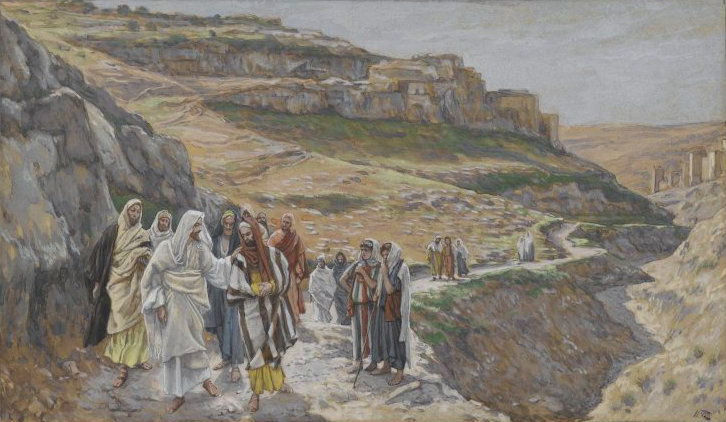
Painting: Jesus Discourses with His Disciples (Jésus s’entretient avec ses disciples), 1886 – James Tissot (Brooklyn Museum)
Stripped of the theological layers and divine attributions, Jesus was a Jewish preacher and religious leader whose teachings and actions have profoundly impacted history and culture.
New York, N.Y. Jesus of Nazareth, often revered as the central figure of Christianity, was fundamentally a human being who lived an extraordinary life in the first century CE. Stripped of the theological layers and divine attributions, Jesus was a Jewish preacher and religious leader whose teachings and actions have profoundly impacted history and culture.

Born in Bethlehem around 4 BCE, Jesus was raised in the small town of Nazareth in Galilee. His early life, as described in the Gospels, was that of an ordinary Jewish boy in a rural area. He likely received a traditional Jewish education, learning the Torah and participating in the local synagogue.
His upbringing in Nazareth, a town far from the political and cultural centers of Jerusalem and Rome, influenced his teachings, which often drew upon the agrarian and communal life of Galilee.
As an adult, Jesus worked as a carpenter, a trade he inherited from his father, Joseph. This occupation not only grounded him in the daily struggles of ordinary people but also shaped his parables and teachings, many of which utilized metaphors drawn from manual labor, nature, and rural life.
His parables, such as the Sower and the Seed or the Good Shepherd, resonated deeply with his contemporaries, reflecting the realities and values of their everyday existence.
Around the age of 30, Jesus began his public ministry, traveling through Galilee and Judea. He gathered a diverse group of followers, including fishermen, tax collectors, and women, which was unconventional at the time.
His message of love, forgiveness, and the imminent Kingdom of God was radical, challenging the social and religious norms of the day. Jesus advocated for the marginalized, healed the sick, and spoke out against hypocrisy and injustice, actions that garnered both admiration and hostility.
One of the pivotal moments in Jesus’ life was his baptism by John the Baptist in the Jordan River.
This event marked the beginning of his ministry and affirmed his role as a spiritual leader. Unlike the powerful and the elite, Jesus chose a path of humility and service. He often sought solitude in the wilderness to pray and reflect, underscoring his deep connection with God and his commitment to his mission.
Jesus’ teachings, preserved in the Synoptic Gospels, emphasize compassion, humility, and love for one’s neighbor. The Sermon on the Mount, a collection of his core teachings, outlines a moral vision that includes the Beatitudes, advocating for peacemakers, the merciful, and the poor in spirit. His instruction to “turn the other cheek” and “love your enemies” was a revolutionary call to non-violence and unconditional love.
The final phase of Jesus’ life was marked by his journey to Jerusalem, where he faced increasing opposition from the religious authorities. His actions in Jerusalem, particularly the cleansing of the Temple, where he overturned the tables of the money changers, were seen as direct challenges to the established order. His growing popularity and radical message alarmed both the Jewish leaders and the Roman authorities.
Jesus was eventually arrested, tried, and sentenced to death by crucifixion, a common Roman method of execution for criminals and insurgents. His crucifixion, around 30 CE, was intended to serve as a deterrent and a display of Roman power. However, for his followers, Jesus’ death was a moment of profound sorrow and confusion. Despite this, his teachings and his life inspired a movement that continued to grow after his death.
In understanding Jesus as a human being, it is essential to recognize his profound empathy and commitment to social justice.
He was a man deeply connected to the struggles of his people, advocating for a vision of society grounded in compassion and equality. His legacy, as a teacher and a reformer, has endured precisely because of his humanity, resonating across cultures and eras.
In conclusion, Jesus of Nazareth was a historical figure whose life and teachings have had an enduring impact on the world. Stripped of theological interpretations, he emerges as a deeply empathetic and revolutionary figure, whose commitment to love, justice, and humility continues to inspire millions. His story is not just one of divine intervention but of a human life lived with extraordinary purpose and conviction.
From Carpenter to Preacher: The Real-Life Story of Jesus of Nazareth (Dec. 24, 2023)
#JesusOfNazareth, #HistoricalJesus, #HumanStory
Tags: Jesus, Nazareth, Historical Figure, First Century, Jewish Preacher, Social Justice, Religious History